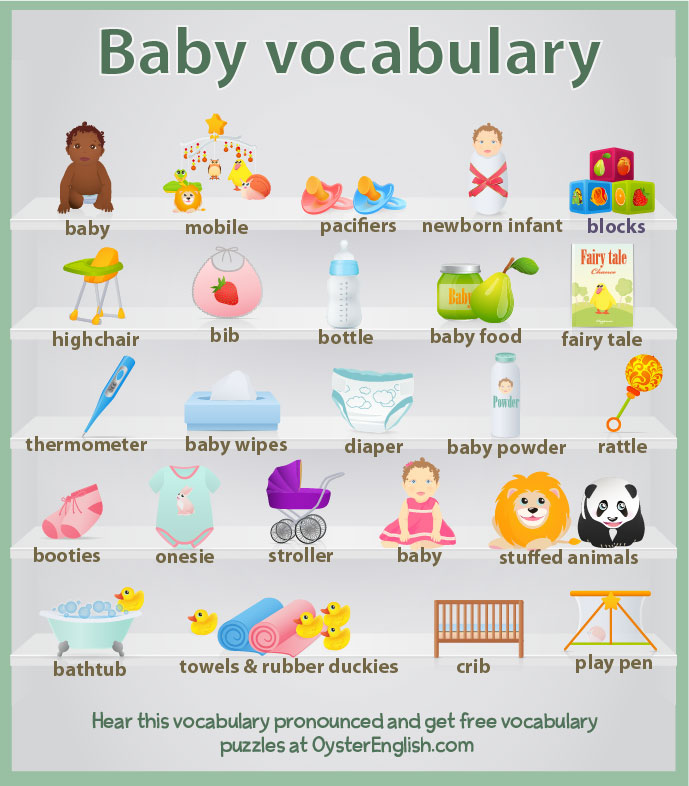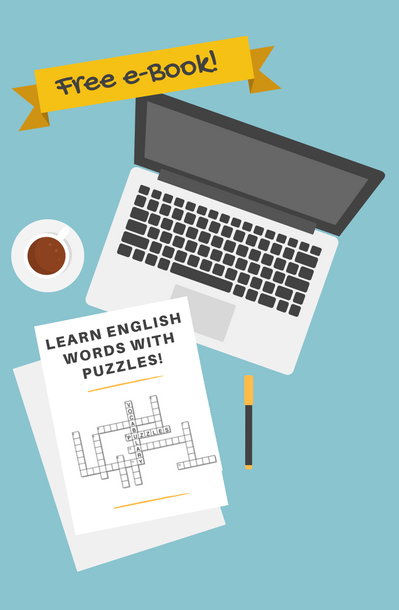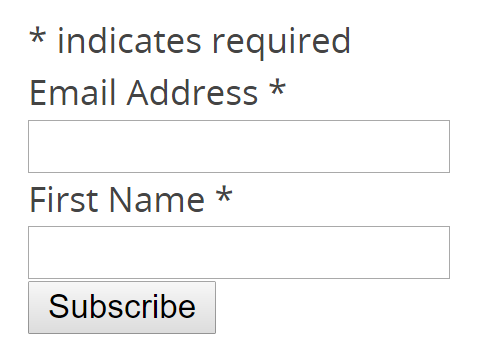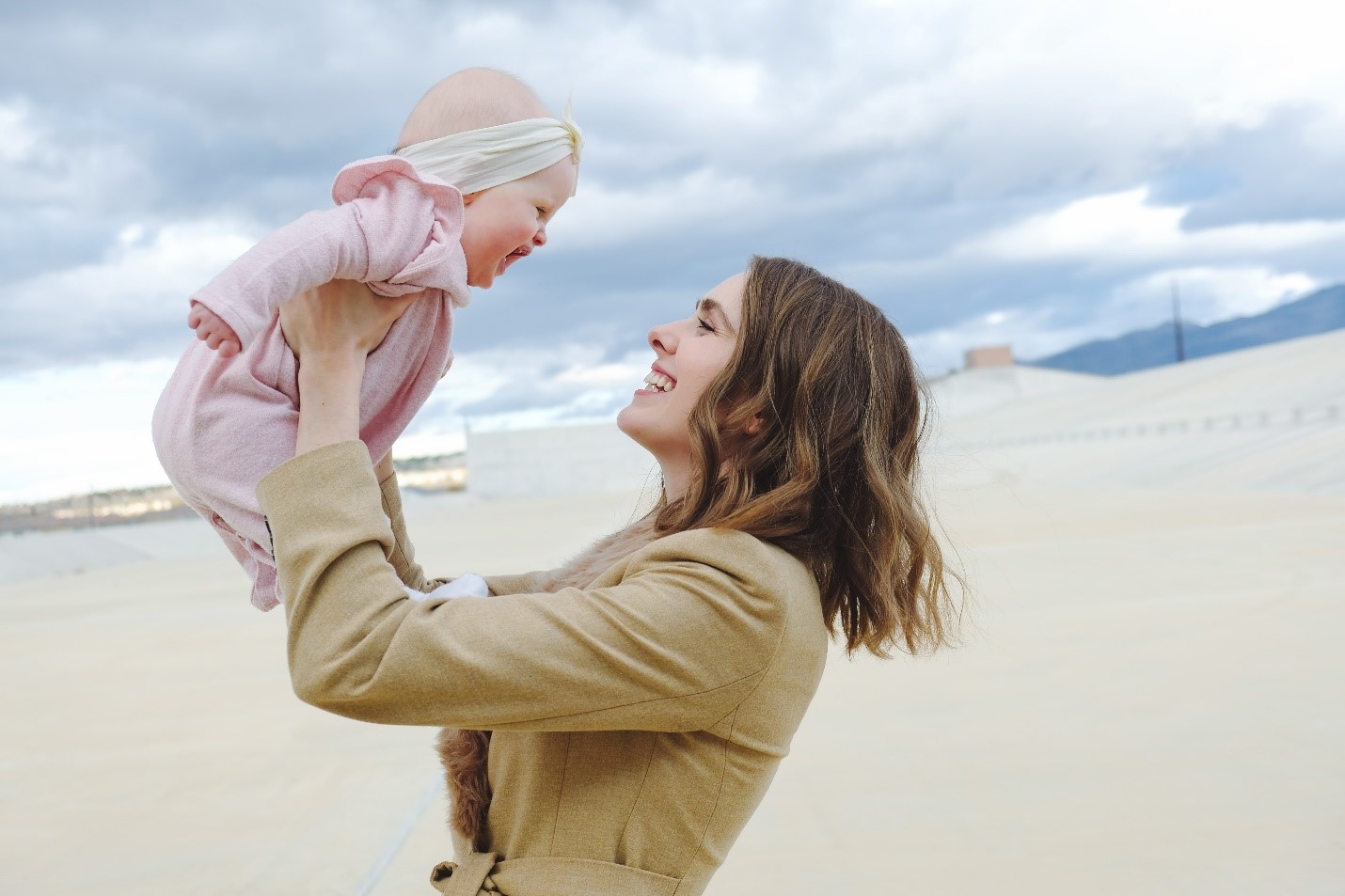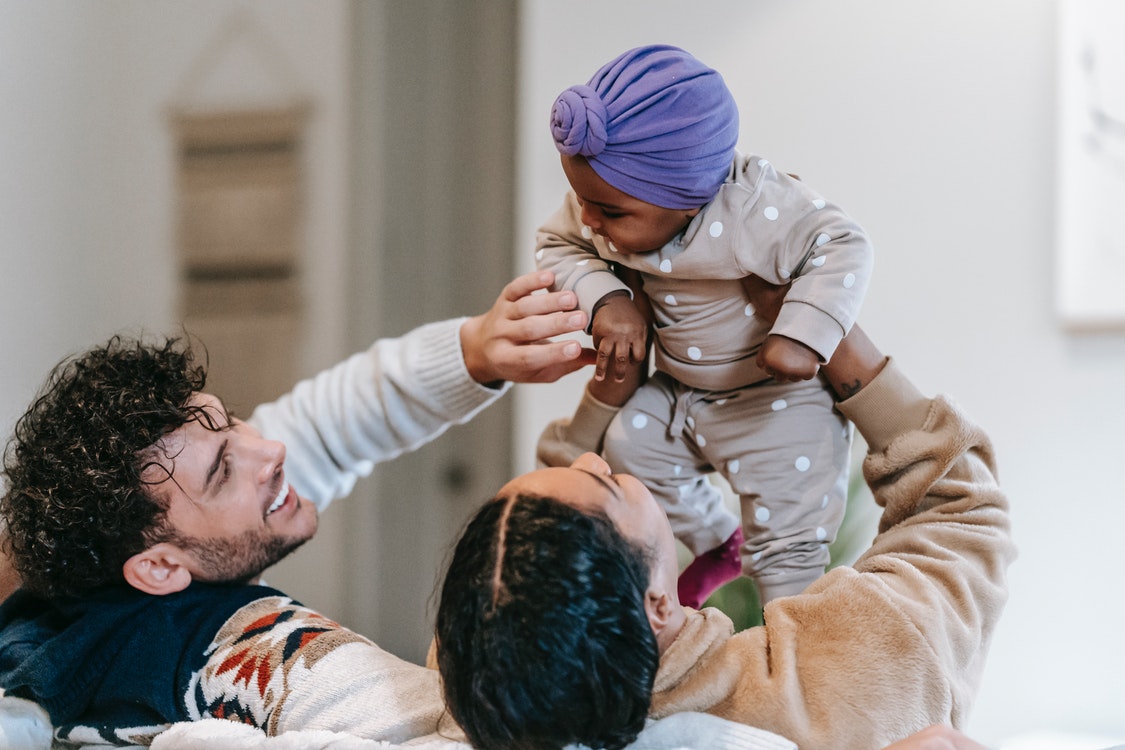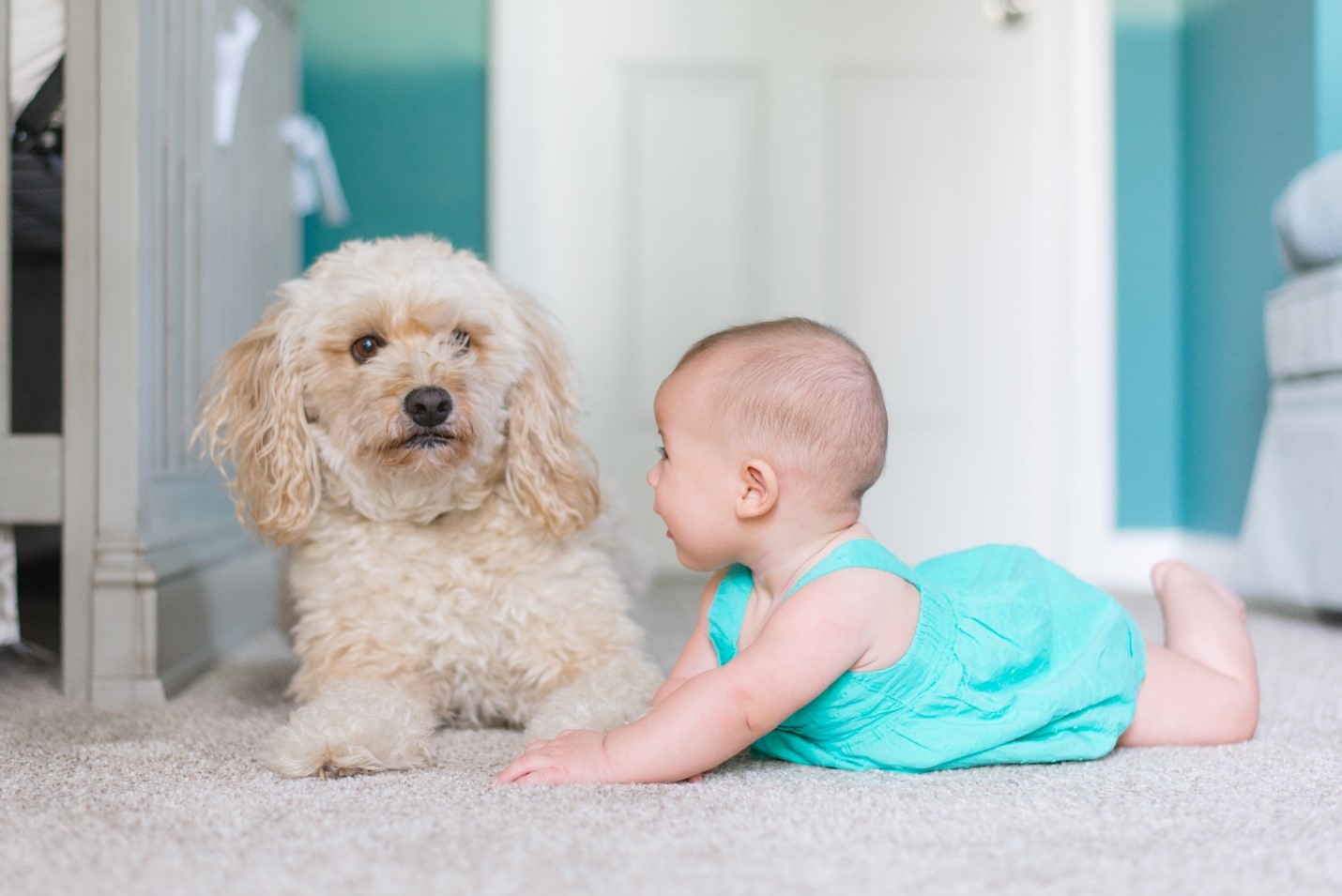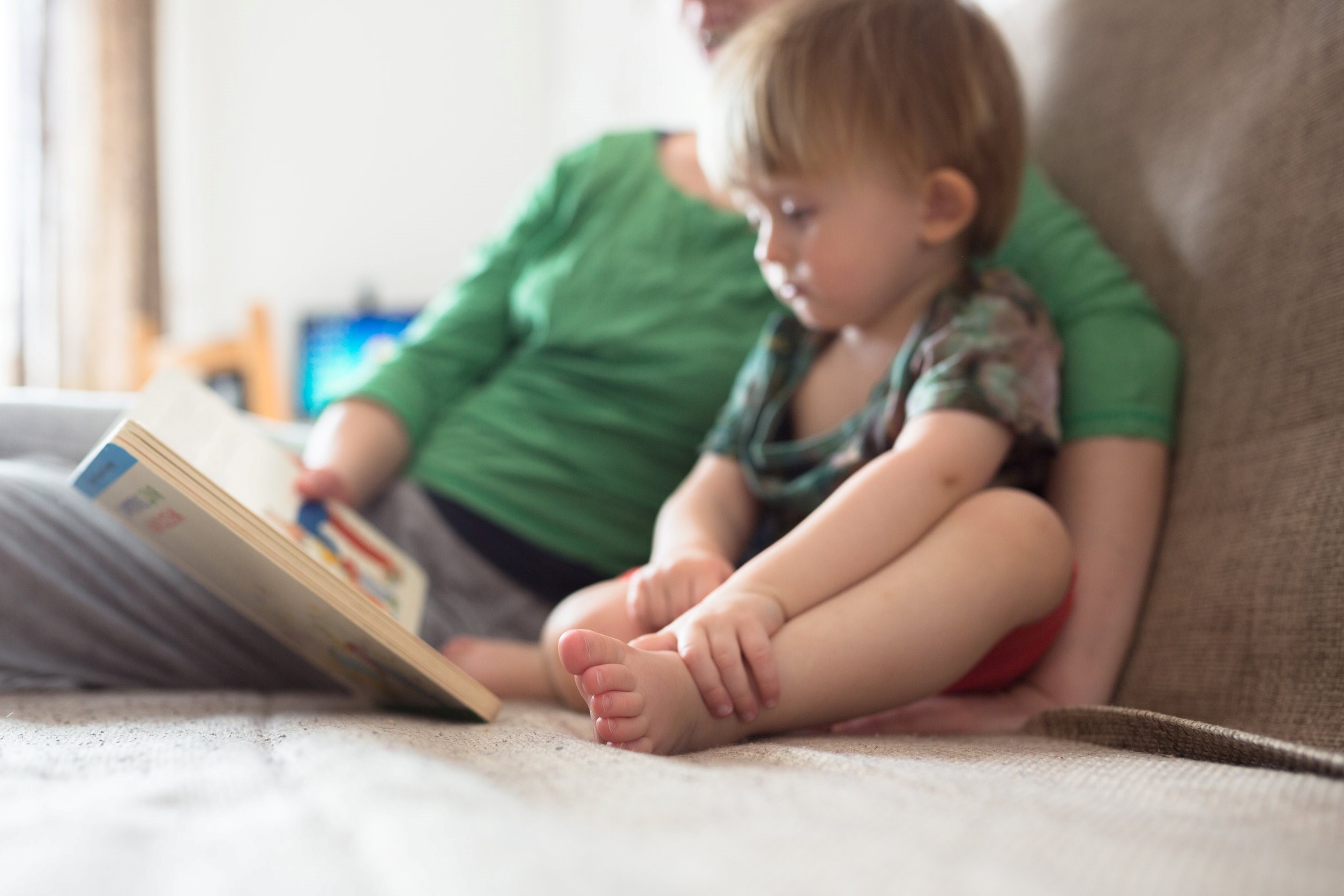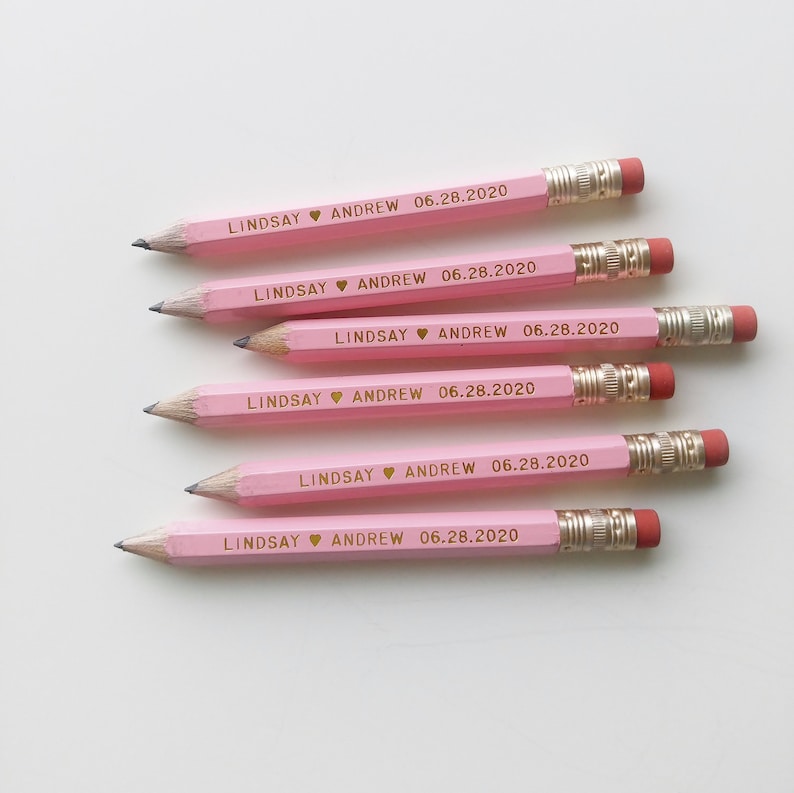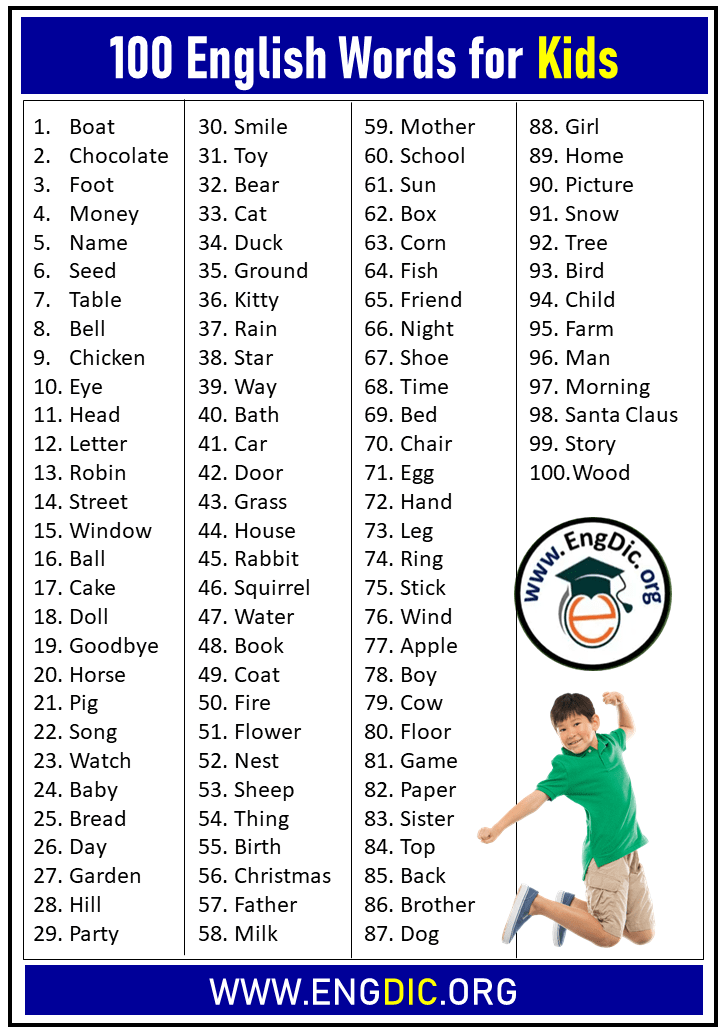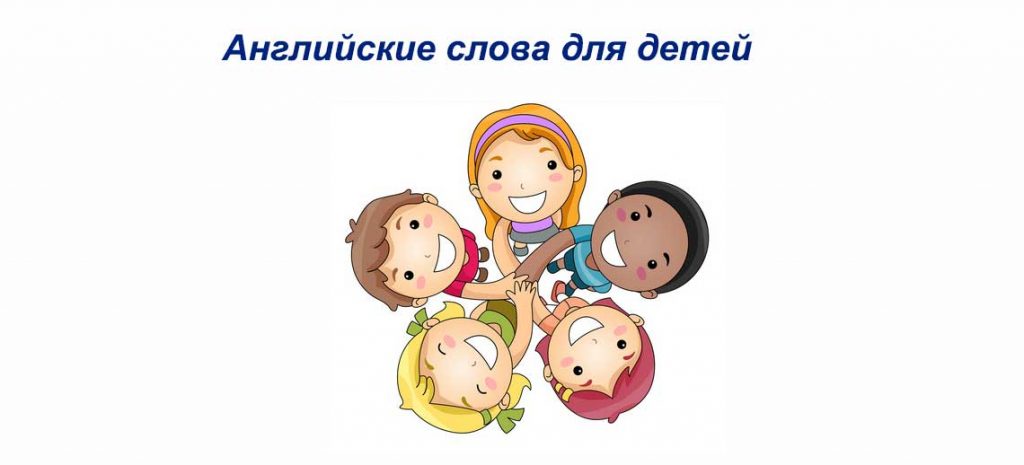The first word that comes out of a baby’s mouth is always memorable. Here are more than 100 easy words you can teach a baby for making it their memorable first word or first few words.
Common First Words for a Baby
These are the most common words for kids in the English Language. The other common words include the sounds and names of people, animals, and things. Even in American English, the 10 most common words are Daddy, Mommy, Hi, No, Ball, Bye, Banana, Baby, and Woof Woof. You will find all of the words in the list. These words are also the most frequently used and heard words.
| Mommy | Daddy | Ball | Car | Bat | Cat | Baby |
| Yes | No | Hi | Bye | Banana | Apple | Duck |
| Horse | Pig | Lion | Tiger | Zebra | Donkey | Cow |
| Bike | Fish | Rat | Bird | Dog | Bee | Tree |
1. Greetings/ Social Words
Here are some easy greetings and social words you can teach your children. These words are easy to teach and some are also the first words of children because of the common use of these words. For example, you can teach your baby to say good morning to others when they wake up, and say goodbye when they go to work.
| Hello | Hi | Please | Bye | Sorry |
| Thanks | Welcome | Yes | No | Okay |
| More | How are you | Goodnight | Sweet dreams | I am good |
| Hey | I am fine | Goodbye | Take care | See you later |
2. Verbs
Verbs basically represent an action. You can teach the basic verbs to babies by showing them the action and then telling them what it is called. Reinforcing this habit will eventually make them understand what a certain action means. For example, while feeding them, you can let them know that they are ‘eating’ the food. While going to work, you can let them know that you are about to ‘go’.
| Run | Eat | Go | Color | Push |
| Draw | Get | Stop | Hug | Paint |
| See | Drink | Pull | Catch | Smile |
| Take | Throw | Slide | Blow | Play |
| Cry | Shop | Fix | Use | Saw |
| Make | Come | Ride | Used | Call |
| Wash | Made | Look | Work | Sing |
| Sit | Kiss | Fell | Study | Love |
| Say | Dance | Open | Called | Be |
| Give | Help | Fall | Close | Want |
3. Pronouns
Single or double letter pronouns like I, me, he, it, my, etc. are all quite easy to teach, and learn. Teaching babies pronouns is a good idea as it is probably easy to learn than any other word class. For example, you can ask them who is your mom? To which they will eventually point you out, and then if you ask who is the baby, they will point at themselves. They often enjoy such games. Cute, isn’t it?
| I | Me | You | He | She |
| It | My | Him | Her | They |
| This | That | Which | What | Who |
| Mine | Yours | His | Hers | Their |
| Your | Its | Whose | Whom | Each |
| We | Us | Them | Theirs | Our |
4. Prepositions
Words like up, down, in, out, are used quite commonly and can prove to be really easy to learn for babies. They can learn such words when you simply point upwards or downwards.
| Up | Down | In | Out | On |
| Off | Here | There | As | At |
| By | After | Below | For | From |
| Near | Like | Far | Of | Over |
| Plus | Minus | Per | Round | Save |
| To | Under | With | Above | Till |
| Away | But | Close | Next | Past |
5. Adjectives and Adverbs
Emotions, colours, numbers, are all quite easy to learn. Similarly, adverbs like hot, and cold, are also easy. For example, you can show them ‘hot’ food, or ‘cold’ water.
| Big | Small | Hot | Cold | Fast |
| Slow | Fat | Fit | Kind | Good |
| Bad | Happy | Sad | Tiny | Tall |
| Short | Huge | Little | Great | Loud |
| Wet | Dry | Red | Blue | Green |
| Yellow | Black | Orange | White | Purple |
| All | Some | More | Less | Rest |
| Pink | Grey | Brown | None | Clean |
| One | Two | Three | Four | Five |
| Six | Seven | Eight | Nine | Ten |
English Baby Vocabulary
This baby vocabulary covers all the basics!
Click the player below to hear a recording of the names of the words of the pictures shown above.
Your browser does not support the audio element.
Get Your Free Vocabulary Puzzles eBook
Solving puzzles is a great way to learn vocabulary. This book contains more than 25 crossword, word search and word scramble puzzles on twenty (20) different topics.
Along with the FREE ebook, you’ll receive my weekly newsletter with tips, lessons and special offers just for my subscribers.
Enter your name and email address below to get your free copy.
Notes about baby vocabulary
If you have a baby or infant you know that there are a lot of things that are needed to take of them. This is a list of basic items for feeding, clothing and caring for a baby.
Please note that this list includes baby vocabulary in American English.
baby or infant
newborn infant (or «newborn»)
a very young child. We usually use this to describe children who have not yet started to walk. To describe a very, very young child (in the first few days or weeks) we can also say a newborn infant or just a newborn.
mobile
a hanging toy with that is attached to a baby’s crib. They can soothe a baby (make the baby calm and sleep) or give the baby something interesting to see.
pacifier
a small plastic object with a rubber top to put in a baby’s mouth that soothes and calms them when the suck on it.
blocks
square wooden cube toys.
high chair
a tall chair with a table attached that makes it easier for parents to feed the baby.
bib
a cloth or plastic cover that ties around the neck and is worn to protect a baby’s clothes.
bottle
a plastic or glass container that has a rubber top (a nipple) that is used to feed a baby milk or other types of liquid drinks.
baby food
soft mashed or pureed food (because babies do not have teeth to chew the food).
fairy tale
a magical story for children that has pretend (mythical) animals, creatures and characters.
thermometer
a device used to measure the temperature of the body.
baby wipes (or wet wipes)
a wet piece of paper or cloth for cleaning that can be thrown in the trash (garbage) after using it.
diaper
underwear made of cloth or disposable material for urinating and defecating.
baby powder
a powder used on a baby’s bottom to prevent diaper rash.
rattle
a toy that makes noise when someone shakes it.
bootie
a short and thick knitted sock that keeps a baby’s foot warm.
infant bodysuit («onesie»)
clothing that covers the chest and bottom and is fasted underneath with snaps or buckles and makes it easy to change a baby’s diaper. («onesie» is a brand name for a product made by Gerbers Childrenwear — many Americans call any infant bodysuit a «onesie» but the real name is infant bodysuit).
stroller
a small chair with wheels that is used to push a baby or child around. It can be folded up and down so the baby is sitting or lying down.
stuffed animal
a toy that is sewn with cloth and stuffed or filled with soft material inside.
bathtub
a container that holds water for bathing. There are special small plastic bathtubs that fit in the sink that make it easier to bathe (or wash) infants.
rubber duckie
a small rubber or plastic-shaped yellow duck that many children play with in the bathtub. This toy became popular in the 1970s because of the television show Sesame Street (the Muppets character Ernie used to sing about his rubber duckie).
crib
a small bed for babies that has high slotted sides so a baby will not fall out.
playpen
a small piece of furniture to keep a baby in a place so they cannot harm themselves or run away.
Your turn to practice
There are a lot of items that are needed to take care of infants and small children so this is just a basic list of baby vocabulary.
Do you have a baby? What are your «must-have» items (things that you feel are so important you must have them)? What items are popular for people you know who have babies?
Practice your English by writing your answers on a piece of paper or by speaking out loud to yourself or with a practice partner. Remember, practice makes progress!
-
Home Page
-
Main Vocabulary List
- Baby Vocabulary
›
›
The first word uttered by a child is one of the most exciting moments for parents. It’s kind of like hearing your baby speak, except they are only using one word. To make it even more exciting, there are certain first words that you can expect from your little bundle of joy!
The most common baby first words include variations for parents such as “mama,” “mommy,” “dada,” “daddy,” and “papa.” After those, you can expect a wide variety of words to follow such as “no,” “uh-oh,” “please,” “ball,” and more!
This article will discuss 30 common baby first words and their meanings so you can be sure to know what to say when your darling finally starts talking.
The Most Common Baby First Words to Expect
Here is an extensive list of common baby first words and their meanings:
- Mama – This is usually the first word, or one of the very first uttered by a child. They are very likely to call their mother by this name.
- Mommy – The female version of “Daddy,” this is another favorite first word used by young children when talking about their mother or any similar-looking female.
- Dada – This is the male version of Mama, and it’s equally common for young children to use these words when referring to either parent.
- Daddy – This is one of the most common first words, and it usually comes after they’ve seen you for a while or have been given to their father.
- Papa – This is another common first word that babies will learn, and it usually means the same thing as “daddy.”
- Uh-Oh – This is one of the first words that young children learn, and it’s usually used when they’ve done something wrong.
- Ball – After parents, there are many first words that will be related to everyday objects. This is one of the most common, and it’s usually a ball of some kind (although sometimes children also use this word for other round things.).
- Yes – This is one of the most common first words, and it’s usually followed by another word or phrase.
- Stop – Another important first word used to express displeasure at something not wanted (such as a parent putting them down) or to emphasize something (such as “no” or “uh-oh”).
- No – This is an important word, but it’s also a slightly negative one that can be used in place of “No.” You should teach your child the appropriate times to use this word, so they don’t accidentally start saying something inappropriate!
- Up – The opposite of down, babies will learn these words at a very young age. They can be used to express that something is not where it should be or as an expression of excitement about being picked up from the ground!
- Down – The opposite of up, this word will also be learned early on by babies and toddlers. It’s usually paired with “up” but can also mean other things, like the opposite of “stop” or that something is not where it should be.
- Doggy – This word will usually follow the naming of a specific animal, and your child might repeat this many times when they see their pet in person after calling them by name at home.
- Dog – This can be one of the first words, and it usually means any dog in general. Children will sometimes use this word when talking about other animals too (like a cat or even lion!)
- Puppy – This is another word that will usually be used when naming a specific type of animal, and it’s often paired with the words “dog” or “cat.”
- Cat – This is another common first word, and it’s usually used to describe any feline friend.
- Kitty – This is another common first word and it will usually come after the naming of a specific type of feline.
- Bye – It’s not unusual for babies to start saying their version of “goodbye” well before they learn how to actually wave bye-bye.
- Bye-bye – Another common first word, this means that your little one wants you to pick them up or move them somewhere else. It can also be used as an all-purpose goodbye.
- More – This is a common request from babies and toddlers, who might not yet know how to ask for more by using words like “please.” It can also be used as an expression of satisfaction when they’re done eating or playing!
- Please – Another important word that will usually come after the first set of words, this is how your baby will ask for things from you. It’s important to teach them the difference between “Please” and “Thank You.”
- Thank you – This is another common first word that babies learn very early on! It shows their gratitude after they’ve been given something or allowed to do something.
- All done – They might not be able to say this word exactly, but your child will let you know when something is finished (like a meal, bath time, and playtime!)
- All gone – This is an important word for babies because it refers to something being out of their reach! They might be too young to verbalize this specifically but will show you what they mean when there’s nothing left for them to eat or play with.
- Boat – Another common first word based on an everyday object. This is usually paired with “Bye-bye” to mean the child wants you to give them their toy boat!
- Car – Another common first word based on everyday objects, this will usually refer to any type of vehicle and not just cars! You might want to teach your child about the difference between “Car” and “Train.”
- Plane – This is yet another common first word, but it can sometimes be used in place of “Car,” so you’ll want to teach your child the difference between these two vehicles. This is very common, especially in babies that are fed with the classic “here comes the plane!”
- Here – One of the very first words, this is used when they want you to come over and pick them up or give something to them. It’s also paired with “There” for a few more common word combinations like “Hide-and-Seek.”
- There – This will be another important word that your baby learns, and it’s usually paired with “Here” to mean that something is over there.
- Shoe – This is another common first word, and your toddler will usually know how to use this because they see you putting them on their feet.
When Should You Expect Their First Words?
According to parents, most babies start speaking their first words around the age of 12 months. Typically, at this time they also begin walking and making other developments in motor skills as well. It is a pivotal point in their lives and marks the beginning of a whole new world.
It can be surprising to most parents when their baby says his or her first word, but there are also words that you should expect from your little one based on statistics.
However, you can begin to expect cooing as early as 2 months old. Cooing should sound distinct from babbling. At this point they are just beginning to learn how to use their vocal cords. Parents can encourage this behavior by acknowledging them when they coo.
How Can You Encourage Your Baby to Talk?
There are many ways you can encourage your baby to speak.
Talk Back
First, talk back! As soon as they begin cooing or babbling respond by smiling and saying words like “yes” or “oh?” This encourages them to keep communicating with you in this way.
You should also get down on the floor around their level when they want something. This is a great way for them to learn valuable communication skills and how they can get what they need from an adult when in the future, it’s not possible to always have their needs met by you or someone else who loves them so much.
Listen to Them
Parents should also take the time to listen. If you’re cooking dinner and your child is playing nearby, stop for a few moments every now and then to focus on what they are saying or asking for!
Even when they’re only making random sounds, they could already be attempting to vocalize actual words. Thus, it is important to listen to them.
Read Together
Reading to your baby is another great way for them to learn! Read books that are appropriate for their age and read slowly so they can hear each word. This will help them begin to understand language as well as expand upon what words sound like outside of just hearing you speak around the house or at bedtime every night.
Sing Songs Together
This can be a great way to bond and spend quality time with your child as well. They will enjoy the tunes and repetition of certain songs, so sing these often or even just hum them when you’re thinking about them!
Repeat Words
The more parents repeat common words, the more likely their baby will learn that word and use it themselves. Try to incorporate these words into your everyday speech as much as possible, even if they don’t understand what you’re saying just yet!
Should You Worry about Their First Words?
Your baby’s first words are an important milestone.
However, if your child isn’t saying any real words by the time they’re 15 months old you should talk to their doctor. This is a reasonable expectation and might not require too much concern on your part, but it’s always better to be safe than sorry! If there is some kind of issue, early intervention can help them gain their language skills and be on the same developmental track as most children.

Lori Herbert lives in a house of all males — a husband and three lively boys. She believes that parenting is messy, and that’s okay. Thanks to her experience in Psychology, she’s learned how that was the case for most people — and that the best way to help them open up was through kindness, compassion, and communication.
You are here: Home/ Games/ Ultimate List of 100+ Baby Words for Baby Shower Pictionary, Charades & Bingo!
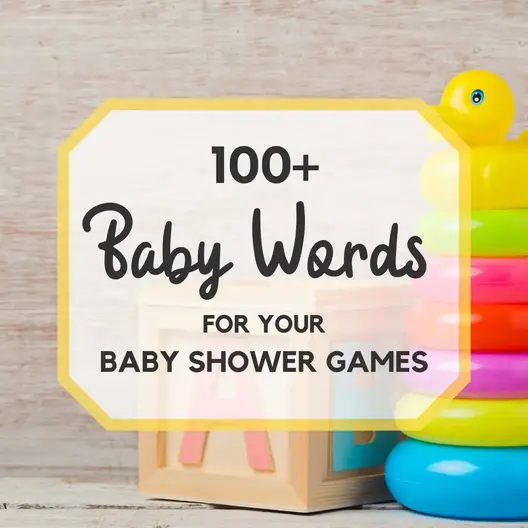
I hope you love the recommendations on this page. Just so you know, I may receive a small commission for any purchases through the links found on this page. I really appreciate your support.
Baby Shower Fun with Word Games!
Oh baby! Is there anything more delightful than the news of a new baby on the way? No way! There’s just something about having a new little squishy bundle of joy in your arms that can melt the hardest of hearts. It’s truly no wonder why people go all out to spoil these little babies while we’re still waiting for them to arrive!
What is it about baby showers that make them so fun? It’s not like there’s a baby here to oogle over yet. Being in good company is a given, but I’ve been to some pretty awkward baby showers, and I can tell you from experience that one of the things that makes a baby shower so fun and successful is the games that are played! If there’s nothing to break the ice, there’s going to be an awful lot of awkward silence!
This is where games like baby shower charades, baby shower pictionary and a giant list of words to play with really comes in handy (don’t worry we’ve got you covered)! There are lots of different baby shower games to be played, but I will only get into the ones that involve baby words. Here are some of the games that these words can apply to:
Game Ideas
- Baby Scramble: Take a bunch of baby words and simply scramble them up, leaving a space next to the scrambled word for each attendee to write the unscrambled word. Set a timer and whoever has the most words correctly unscrambled is the winner!
- Baby Word Search: You can find these online or make your own. Using a word bank of baby-related words, hide them in a block full of other letters. Each word that is found should be circled.
- Baby Crossword: Describe things that are related to a baby, and these are the words that will be filled into the puzzle.
- Baby Charades: If you really want to get people up and social, this is a good one to play at a baby shower. Write a bunch of different baby words on paper which will be drawn from a hat and acted out.
- Baby Pictionary: Split into teams and elect an artist. The artist will race a clock to draw out a baby word that was picked from a hat and the team must guess it to get the points. If the team cannot guess in time, then another team gets a shot at it for the points! Baby shower pictionary is definitely a mainstay for every baby shower.
- Baby Bingo: Each person will write in baby items on their BINGO grid, and place a mark over each one that gets called out until they get their five in a row! BINGO!
Baby Shower Charades, Pictionary and Bingo Words Lists
With all of these word games, you will need a list of baby words to help make the games (and prizes)!
Actions
- Cry
- Smile
- Coo
- Hiccup
- Burp
- Fart
- Nurse
- Babble
- Giggle
- Poop
- Suck thumb
- Roll over
- Sit up
- Cruise
- Crawl
- Walk
Clothing
- Onesie
- Hat
- Socks
- Shoes
- Sleepers
- Gown
- Swaddle
- Mittens
- Booties
- Cloth diapers
- Wearable blanket
Essentials
- Diapers
- Wipes
- Bottles
- Nipples
- Bottle brushes
- Bottle warmer
- Bibs
- Burp cloths
- Receiving blankets
- Baby wash
- Baby powder
- Baby oil
- Diaper rash cream
- Baby lotion
- Hooded towel
- Pacifiers
- Rattle
- Crib mattress
- Mattress cover
- Mobile
- Wipe warmer
- Children’s books
- Teething rings
- Diaper bag
- Changing pad
- Changing mat
- Grooming kit
- Bowls
- Baby spoons
- Sippy cups
- Baby formula
- Baby food
- Rice cereal
Baby Gear
- High chair
- Walker
- Bouncer
- Activity gym
- Exersaucer
- Floor seat
- Pack n’ play
- Playpen
- Baby swing
- Car seat
- Stroller
- Vibrating seat
- Crib
- Changing table
- Rocking chair
- Bassinet
The Not-So-Pleasant
- Cradle Cap
- Diaper Rash
- Colic
- Blowout
- Spit up
- Fussy
- Engorgement
- Wake ups
- Restlessness
- Booboos
- Teething
- Cracked nipples
Health and Safety
- First aid kit
- Gas drops
- Gripe water
- Teething tabs
- Doorknob covers
- Outlet covers
- Baby gates
- Cabinet locks
- Toilet seat lock
- Baby monitor
Mommy Needs
- Nipple cream
- Breast pads
- Breast pump
- Milk storage bags
- Nursing tops
- Nursing bras
- Nursing pillow
- Coffee (lol)
Game Supplies
Super Useful Timer
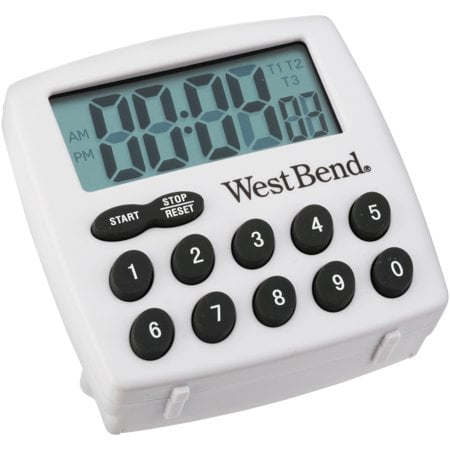
Many games of these games use a timer. Smartphones are nice, but messing with lock screens and notifications gets old. Once you get a 10 digit timer, you won’t go back. Don’t feel bad about picking one of these up for the shower because you’ll use it while cooking, or playing games with your little ones.
These timers have stands, clips and magnets. You can stand it on a table, clip it to your jeans, or attach it to the refrigerator. My husband attaches it to his belt when grilling food to keep track of grilling times.
Pink or Baby Blue Paper
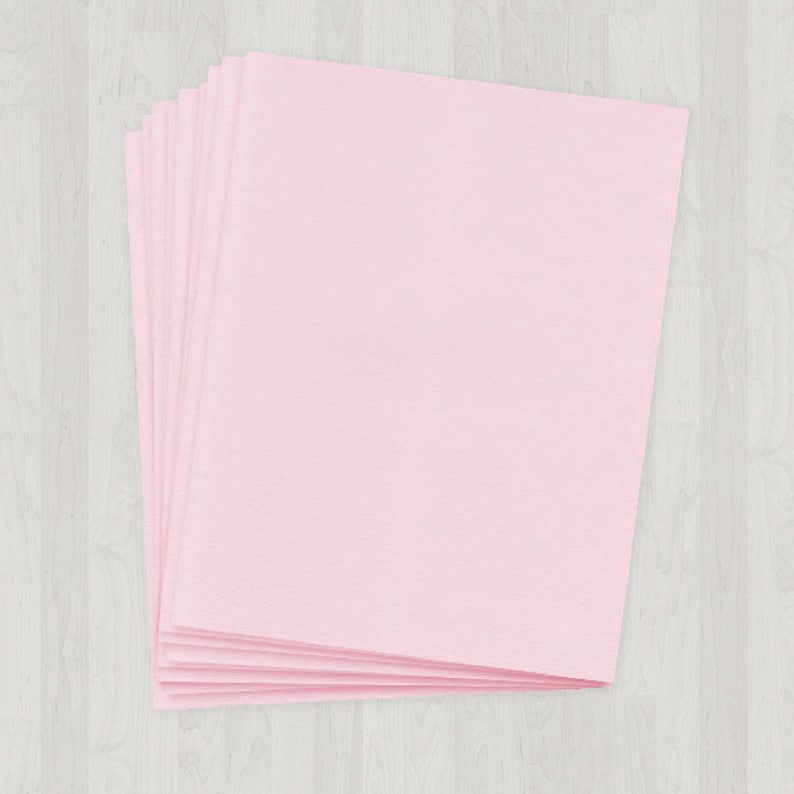
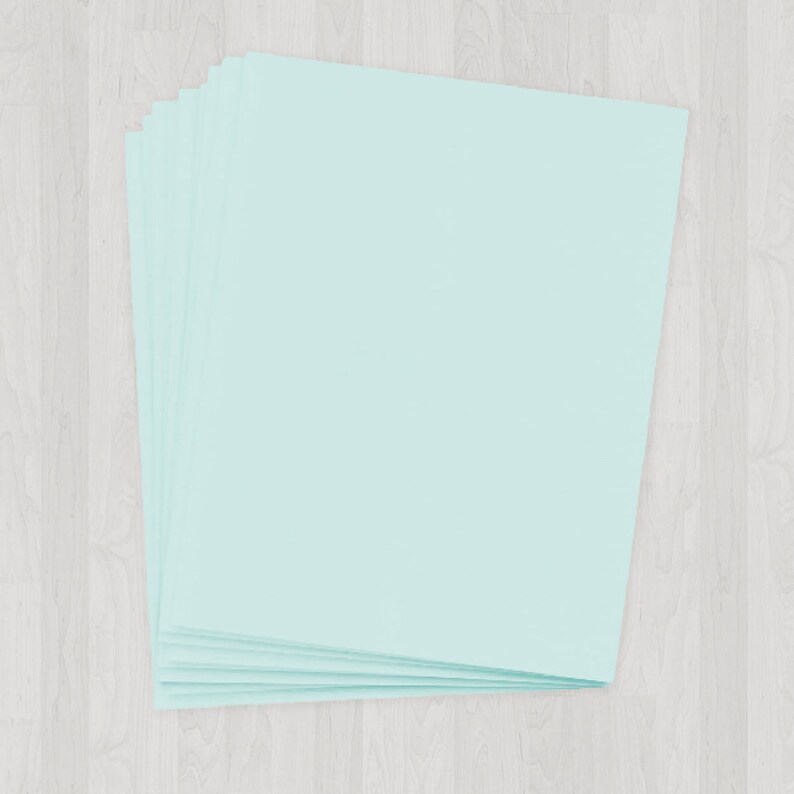
Yes, you could use ordinary, white printer paper, but how much more fun is the blue or pink paper for printing on?
Check Etsy’s Prices:
Customized Baby Shower Favor Pencils
This is a cute, and inexpensive shower favor. Perfect for filling out the game sheets, but shows a lot of care and attention. Yes, you could use school bus yellow pencils, but why not make a boring pencil into a cute decoration and party favor? That’s a lot more special.
Along with fun games at the shower, the other element to a baby shower that can make or break it is the food! Who doesn’t love a party with good food? Heck, you can even use baby words to give the food selections baby-themed names!
If you’re at all curious how this word list could be used, here’s a great video demonstrating:
Baby Shower Charades Video:
Laura is a stay-at-home-mom of 4 energetic, little boys. When not playing with them or cleaning up their Legos (or worse, stepping on them), she can be found watching Pixar movies with the family, or writing here on Pink Ducky.
Reader Interactions
Useful words and phrases to talk about pregnancy and babies in English.
My friend got pregnant / conceived in April and her baby was born in January.
She waited until the second trimester (after three months) to tell people, as by then there is less risk of losing the baby / having a miscarriage. During the pregnancy she had terrible morning sickness and she also had cravings (a strong desire to eat something) for cheese and pickle sandwiches.
The birth itself was uncomplicated. She went into labour at midnight, and the baby was born at 7 a.m. She didn’t feel too much pain and didn’t need an epidural. Instead, she was on drips to make the contractions come a little quicker. Her midwife (special nurse who follows a woman throughout pregnancy) was with her during the birth, just to make sure that everything went well. Luckily, it was a normal delivery and she didn’t need a Caesarean section (operation). The doctor cut the cord and put the baby on her stomach. He said “Congratulations! It’s a healthy baby girl!”
She and her husband prepared their house before she went into hospital. They decorated the nursery (baby’s bedroom). They also had to buy some baby equipment, such as a baby bath, a changing mat (on which they will change the baby’s nappies), a carry cot (so they can carry the baby around), a cot (for the baby to sleep in), and a mobile (to hang over the cot so that the baby can see moving shapes). Friends and family bought them lots of baby clothes and teddy bears.
My friend is now on maternity leave (paid leave from work to have a baby) while her husband can also take paternity leave.
What to say to new parents
“Congratulations on the birth of your baby boy / girl!”
“Congratulations on the safe arrival of (baby’s name).” (in a card)
“Have you decided on a name yet?”
“She / he’s got your nose / eyes / mouth!”
“What a beautiful baby!”
100 English Words for Kids
As a parent, you want your child to succeed in school and life. A great way to start is by teaching them English. It’s the language of opportunity. But where do you begin? There are over 600,000 words in the English language! We’ve compiled a list of 100 essential words for kids. Learning these basic words will help your child jumpstart their English education and build a strong foundation for success.
So, here is the list of the top 100 words for kids:
English Words for Kids
- Boat
- Chocolate
- Foot
- Money
- Name
- Seed
- Table
- Bell
- Chicken
- Eye
- Head
- Letter
- Robin
- Street
- Window
- Ball
- Cake
- Doll
- Goodbye
- Horse
- Pig
- Song
- Watch
- Baby
- Bread
- Day
- Garden
- Hill
- Party
- Smile
- Toy
- Bear
- Cat
- Duck
- Ground
- Kitty
- Rain
- Star
- Way
- Bath
- Car
- Door
- Grass
- House
- Rabbit
- Squirrel
- Water
- Book
- Coat
- Fire
- Flower
- Nest
- Sheep
- Thing
- Birth
- Christmas
- Father
- Milk
- Mother
- School
- Sun
- Box
- Corn
- Fish
- Friend
- Night
- Shoe
- Time
- Bed
- Chair
- Egg
- Hand
- Leg
- Ring
- Stick
- Wind
- Apple
- Boy
- Cow
- Floor
- Game
- Paper
- Sister
- Top
- Back
- Brother
- Dog
- Girl
- Home
- Picture
- Snow
- Tree
- Bird
- Child
- Farm
- Man
- Morning
- Santa Claus
- Story
- Wood
About The Author
Как маленьким деткам выучить английский язык? Существует масса способов, при помощи которых можно добиться успеха. Но когда вопрос касается изучения языка именно ребятами, то начинать лучше с отдельных слов. То есть не учить сразу предложения, а начинать с самых простых слов. Когда у ребёнка будет достаточный запас слов, можно приступать учить фразы, потом – целые предложения. Заметим, что тема большая, поэтому ее уместно поделить на несколько уроков. На 3-4 уроке начинайте учить малыша сочинять с выученными словами небольшие фразы и предложения. И запомните: чтобы тема была выучена с максимальной эффективностью, английские слова для детей лучше учить с наглядными материалами. Большие красочные картинки – лучшее решение. Раскрасьте уроки для детей яркими красками! Поехали за новыми знаниями!
Содержание
- Английские слова для детей: с чего начать?
- Приветствия
- Еда и вкусности
- Фрукты и овощи
- Подводим итоги
Английские слова для детей: с чего начать?
Как мы уже говорили, тема объемная, и ее лучше поделить на несколько разделов, то есть уроков. Рекомендуем изучить сначала такие темы как ‘’Приветствия’’ и ‘’Еда’’ (подразделы -> ‘’Сладости’’, ‘’Мясо’’, ’’Рыбная продукция’’, ‘’Морепродукты’’, ‘’Фрукты’’ и ‘’Овощи’’). Рассмотрим эти темы подробнее и наведем примеры с переводом.
-
Приветствия
- Сказать Привет! Можно несколькими способами => Hello! и Hi!
- Можно также сказать Добро пожаловать => Welcome!
- Когда обстановка официальная, то нужно говорить => Good morning!, Good afternoon!, Good evening!, что означает Доброе утро!, Добрый день! и Добрый вечер!
Когда что говорить? В разговоре с друзьями и близкими — Hello! и Hi!, в школе и во время разговора с незнакомыми людьми -> Good morning!, Good afternoon!, Good evening!
Когда мы прощаемся, то произносим следующие слова =>
- Bye! -> Пока!
- Goodbye! -> До свидания!
- Good luck! -> Удачи!
- See you soon! -> До скорого!
- See you later! -> До встречи!
Правила этикета гласят, что после слов приветствия нужно сказать еще что-то. Несколько фраз. Для этого идеально подойдут следующие фразы =>
- How are you doing? -> Как у тебя дела?
- How are you? -> Как дела?
- How are things? -> Как жизнь?
И ответы на эти вопросы =>
- Excellent -> Прекрасно.
- Great -> Отлично.
- Not bad -> Неплохо.
- Fine, thanks -> Хорошо, спасибо.
Обратите внимание также на следующие фразы =>
- Nice to see you -> Рад вас видеть.
- Glad to meet you -> Рад познакомиться с вами.
- Happy to see you again -> Рад снова видеть вас.
На заметку! Обратите внимание малышей на то, слово рад представлено в вышеприведенных фразах тремя разными словами -> nice, glad, happy. Это объясняется тем, что в английском языке одно слово имеет несколько синонимов, а в фразах может приобретать совсем иное значение. Синонимы и set phrases мы будем учить потом. Просто вкратце объясните детям, почему одно и то же слово на русском представлено тремя на английском языке.
-
Еда и вкусности
Эта тема малышам будет особенно приятной! Кто не любит вкусные торты, сливочные пирожные с кремом, румяные кексы и ароматную выпечку! Печенюшки, тортики и сладкие трубочки так и манят взоры. Будьте уверены, видя красочные картинки с изображением сладостей, малыш сам захочет учиться! Вот увидите!
Полезная лексика =>
- Cake -> кекс, торт
- Cream -> крем
- Cookies -> печенье, домашнее печенье
- Marmalade -> мармелад
- Pudding -> пуддинг
- Sweets -> сладости
- Sponge cake -> бисквит.
Для изучения этих слов используйте ‘’вкусные’’ картинки. Внимание малыша будет вмиг привлечено и с ребенком легко будет работать! А когда с вкусностями разобрались, приступаем к изучению других слов, которые касаются еды =>
- Cheese -> сыр
- Yoghurt -> йогурт
- Sour cream -> сметана
- Curds -> творог
- Meat -> мясо
- Bacon -> бекон
- Duck -> утка
- Pork -> свинина
- Rabbit -> кролик
- Turkey -> индейка
- Chicken -> цыпленок
- Caviar -> икра
- Fish -> рыба
- Fish soup -> уха
- Crab -> краб
- Herring -> сельдь
- Salmon -> лосось
- Sea products -> морепродукты
- Shrimp -> креветка.
Важно! Не давайте малышу много слов за один урок. А то может получиться неразбериха. Возьмите за правило: одно занятие – не более пяти новых слов. Так вы будете уверены, что ребенок хорошо запомнил выученные слова и будет помнить их долго. Но не забывайте при этом регулярно повторять то, что уже было пройдено на прошлом уроке. В противном случае рискуете начинать все сначала, ведь выученные знания без регулярного повторения легко забываются.
Рассмотрим некоторые предложения с вышеприведенными словами =>
- Today I want to cook something delicious. I need some sour cream, some salmon and some caviar. The dish will be amazing! -> Сегодня я хочу приготовить что-то очень вкусное. Мне нужно немного сметаны, немного лосося и немного икры. Блюдо будет великолепным!
- What is it? – This is a shrimp. It is a seaproduct -> Что это? Это креветка. Морепродукт.
- Do you like crabs? – Yes, of course. They are very delicious and very expencive -> Ты любишь крабов? – Да, конечно. Они очень вкусные и очень дорогие.
- I prefer fish for dinner but my husband likes meat more -> На ужин я предпочитаю рыбу, но мой муж больше любит мясо.
- If you buy some pork I will make tasty chops -> Если ты купишь немного свинины, я сделаю вкусные отбивные.
- For breakfest I choose curds and yoghurt, and you? -> На завтрак я выбираю творог и йогурт, а ты?
Обратите внимание! Чтобы заинтриговать малыша и заставит его брать активное участие в беседе, задавайте встречные вопросы. Вот как в последнем предложении. После того, как скажете свое предложение, спрашивайте -> And you? Так вы будете уверены, что малыш слушает, что вы говорите, и параллельно будет расширять свой запас слов.
Можете также спросить:
- And what about you? (Как насчет тебя?)
- Will you agree with me? (Ты согласен со мной?)
- Do you think the same as me? (Ты думаешь так же, как и я?)
Смотрите, чтобы ребенок не повторял ваши слова, а говорил новые. Так результат будет более эффективным.
-
Фрукты и овощи
В отдельную подкатегорию выделим фрукты и овощи. Они все же должны идти отдельно от стандартной еды. Эту подтему рекомендуем выделить отдельным уроком. И тут-то картинки можно использовать во всех красках! Зеленые, фиолетовые, красные, синие, желтые… Палитра красок будет играть всей сочностью своего цвета! Деткам будет интересно и увлекательно! Вот увидите!
Полезная лексика =>
- Apple -> яблоко
- Apricot -> абрикос
- Grapefruit -> грейпфрут
- Grape -> виноград
- Plum -> слива
- Cherry -> вишня
- Sweetcherry -> черешня
- Strawberry -> клубника
- Cucumber -> огурец
- Tomato -> помидор
- Potato -> картошка
- Artichoke -> артишок
- Cabbage -> капуста
- Eggplant -> баклажан
- Carrot -> морковь
- Celery -> сельдерей.
Чтобы слова легче запомнились, приведем несколько фраз =>
- Sweet strawberry -> сладкая клубника
- Delicious sweetcherry -> очень вкусная черешня
- Sour cherry -> кислая вишня
- Big plum -> большая слива
- Green apple -> зеленое яблоко
- Tasty potato -> вкусная картошка
- Orange carrot -> оранжевая морковь.
На заметку! Чтобы слова были выучены быстрее, поиграйте с детьми в незатейливую игру. Игра очень простая, она состоит из вопросов. Например, вы спрашиваете: Is plum red or blue? (Слива красная или синяя?) Малыш должен ответить, назвав нужный цвет. Но смотрите, чтобы дети говорили в ответ не одно слово, а целое предложение. Более того, задайте встречный вопрос: If plum is blue, what fruit is red? (Если слива синяя, какой фрукт – красный?) Малышу будет очень интересно, тем более если в качестве подсказок вы будете использовать яркие картинки.
Подводим итоги
Научить малыша быстро говорить на английском – реально! Для этого нужно терпение, правильный подход к изучению материала и красочные наочные материалы. Если хотите, чтобы занятия с детьми были эффективными, и ребята начали говорить на английском с первого урока, используйте большие картинки с яркими изображениями и буквами (первая буква слова). Такое простое правило дает сильнодействующий результат. Вот увидите – малыш будет схватывать информацию на ходу! Ассоциации – верный способ сделать уроки эффективными!
Советуем изучить материал про 1000 слов на английском, которые нужно знать новичку в первую очередь, в котором сгруппированы часто употребляемые слова по тематикам.
Успехов и покорения новых вершин!
Просмотры: 7 565

